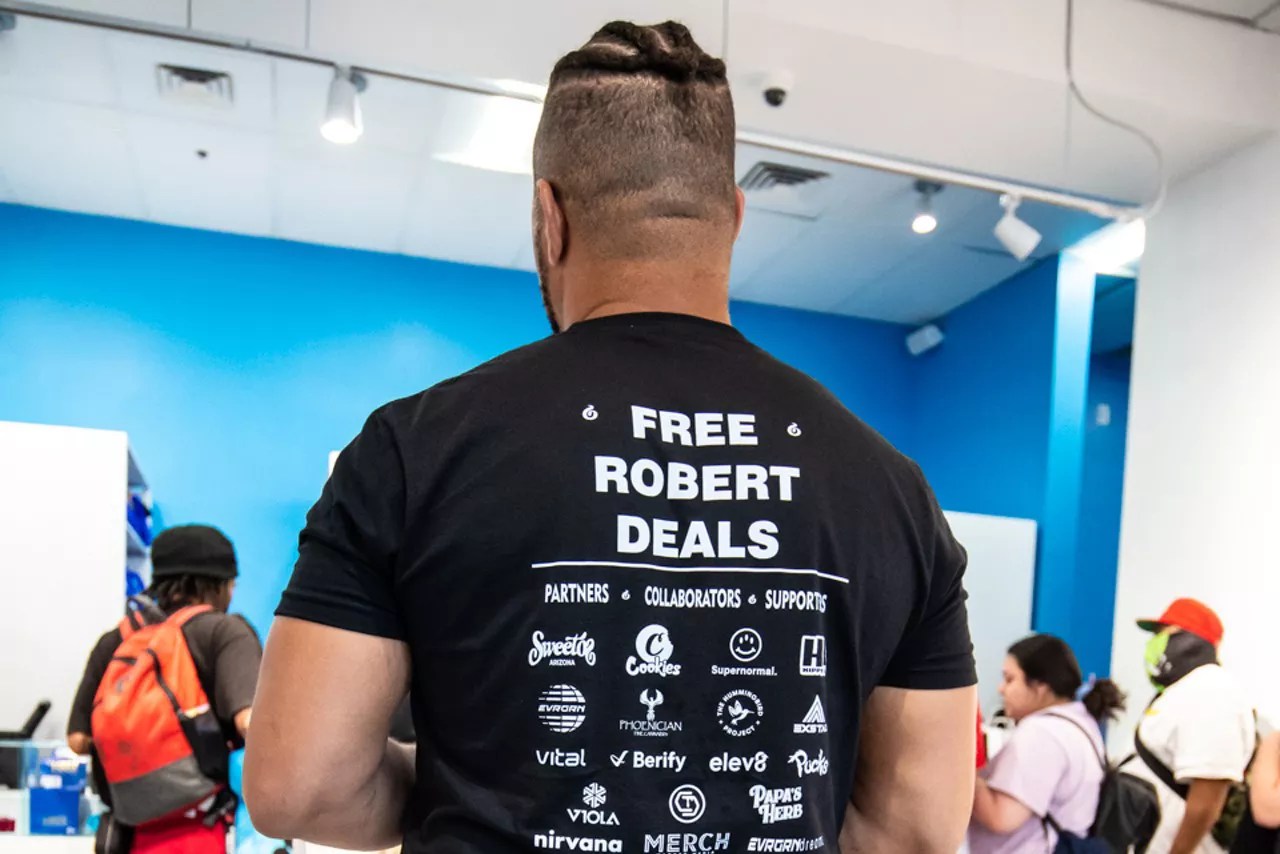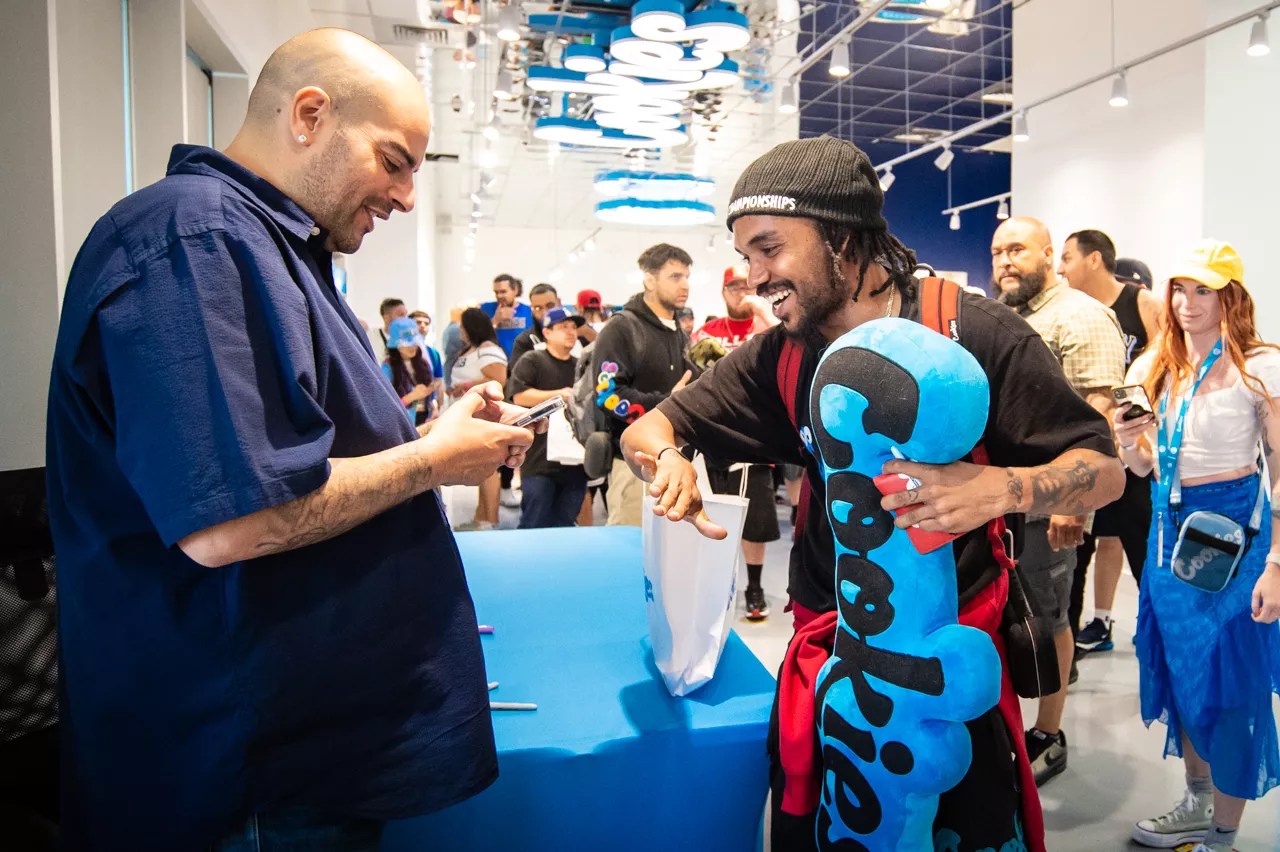
Alicia Deals

Audio By Carbonatix
Editor’s note: This story was updated on Aug. 21 to clarify the partnership between Cookies and Alicia Deals, as well as add additional details about the case of Robert Deals.
***
Weed enthusiasts lined the streets on June 24 as legendary cannabis brand Cookies opened its first dispensary in Arizona. Hundreds of people were hoping to meet its charismatic founder, Berner, and get a hit of Girl Scout Cookies, the flower that helped build the brand.
Amid the party atmosphere and thumping hip-hop beats, Alicia Deals sat in quiet reflection. With the Tempe store, she became the first African American woman to own a dispensary in Arizona. The event was more than a grand opening, though. It was a redemption story.
Thirteen years earlier, on Jan. 13, 2010, Deals’ father, Robert Deals, was arrested for aggravated assault, unlawful flight and marijuana possession, according to court documents. Deals’ father struck a Chandler police officer with his car while fleeing the scene of a marijuana bust involving himself and two other individuals. The officer suffered injuries to her left side that kept her on restricted duty for six months, court records showed.
Deals’ father, sentenced in 2012, is now serving his 12th year of an 18-year sentence in the state prison in Yuma. The case against him, Deals said, has been mishandled by prosecutors.
“When it all boils down to it he had some cannabis and ran,” Deals told Phoenix New Times. “As a veteran with PTSD, in his haste and fear, he mistakenly struck an officer’s hand with the side visor mirror with effects reported by a doctor as ‘slight bruising.’ Nothing in reasonability to constitute six months of recovery nor aggravated assault. This and many other prosecution contradictions show the harsh mishandling of his case.”
But she wasn’t content to let cannabis be the thing that tore her family apart.
“You know, cannabis has been our family’s biggest burden,” Deals said. She was determined to turn it into what she calls “a blessing.”

Alicia Deals has not given up the fight to free her father, who is serving an 18-year sentence in a state prison in Yuma.
O’Hara Shipe
Making it right
In 2021, Deals and her family scraped together the exorbitant legal and licensing fees to apply for one of 26 available social equity licenses. The licenses were a provision of 2020’s Proposition 207, which made recreational cannabis legal in Arizona.
To be eligible to apply, Deals had to prove that she was directly affected by the war on drugs by demonstrating the socioeconomic impact her father’s arrest had on her family. That was the easy part.
“Cannabis companies make money, but we go to jail. They’re out here making millions of dollars, and my father is still in jail,” Deals said.
Although Deals easily met the requirements to obtain a social equity license, there was no guarantee that she would be awarded one. After all, there were 1,506 applications vying for the meager 26 licenses. There also was no guarantee that an awarded license would ever translate into a financially viable dispensary.
As New Times reported last year, many of Arizona’s largest multistate cannabis companies gamed the system by funding numerous applicants to increase their chances of securing additional licenses. In turn, license awardees would be financially indebted to their funders as they remained co-owners of the resulting company.
Deals also was approached by investors, but she quickly turned them down. If she was going to have a cannabis business, she was going to do it her way.
“We’re going to win for everything they’ve taken from us, everything they’ve taken and done to so many men. We’re going to change lives,” Deals promised her incarcerated father.
On April 8, 2022, Deals’ fortitude – and in her own words, “faith” – paid off. She was the lucky recipient of a license and could determine her own fate. Or so she thought.

“We’re going to win for everything they’ve taken from us, everything they’ve taken and done to so many men. We’re going to change lives,” Alicia Deals promised her incarcerated father.
Alicia Deals
The hidden pitfalls of social equity licenses
On the surface, social equity licenses were meant as reparations for communities disproportionately impacted by the enforcement of previous marijuana laws. In actuality, as some critics have pointed out, they were nothing more than a pretty bow placed atop a dysfunctional system.
“That’s the thing about these licenses. You have to come from certain neighborhoods to get one, but you can’t set up your dispensary in the area you came from because of zoning laws. It’s like being exploited all over again,” Deals said.
Many cities in Arizona only allow dual-licensed dispensaries – those with both medical and recreational licenses – to operate. However, social equity licenses only cover recreational sales, which left Deals with two options – neither of which was particularly palatable to the entrepreneur.
She could open in a low-traffic, undesirable area and maintain sole ownership. Or she could partner with a bigger, established company and set up shop closer to Phoenix at the cost of sharing ownership.
“It makes you wonder what the real purpose of these licenses are. Are they really to make amends?” Deals asked.

David Brown could hardly contain his joy on June 24 as Cookies CEO Berner created a TikTok showing off Brown’s collection of Cookies merch.
O’Hara Shipe
A third option
Operating in the outskirts of Phoenix seemed like a losing prospect, and Deals had only 18 months after receiving the license to open her retail outlet. If she didn’t meet that timeline, she would lose the license and the money she invested into it. So, she went back to the drawing board.
If Deals was going to partner with someone, it was going to be with someone whose values aligned with hers, Deals said.
“Often, when your skin is dark, the facts don’t really matter. There’s so many people lost in the system and suffering, as we have, harsh and unjust punishments. And now we’re in the position to dually bridge the gap between those who have suffered and those who have benefited on the basis of cannabis. That’s something I take seriously,” Deals said.
It’s something Berner, CEO of Cookies, does as well.
“I’m also a minority, and I know how underserved minorities are in this space. That’s why we created Cookies University – to educate minorities about the A-to-Z of how to run a cannabis business,” Berner told New Times.
Already a multistate operator and global cannabis brand, Berner had yet to break into the Arizona market. It was something on his to-do list.
“Arizona is like my second home,” Berner said. “The first time I ever smoked weed was here and got a citizen’s arrest out here for smoking weed. But I was able to escape when I was a young boy, so you know, this is like a full circle for me.”
Deals inked a licensing and branding partnership with Cookies to open the dispensary in Tempe.
“I am proud to be the first African American woman in Arizona to open a dispensary, and I am proud to be a part of the Cookies family. The company is doing big things to open doors for other minorities in the space,” said Deals.
But Deals’ journey is far from complete. While her dispensary continues to flourish, Deals is turning her attention toward opening Life Changers Law Firm.
“Doctors save lives. But when it really comes down to it, so do attorneys. Having a capable attorney to help you when you’re facing 10, 12 or 15 years in prison is just like saving your life. We plan to help and change lives with the law firm,” Deals said.
Although her law firm is still in the works, Deals continues to fight for her father’s release from prison.